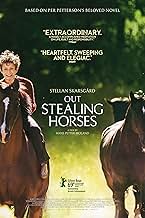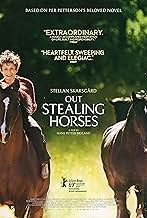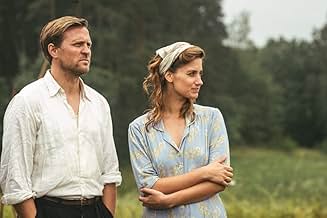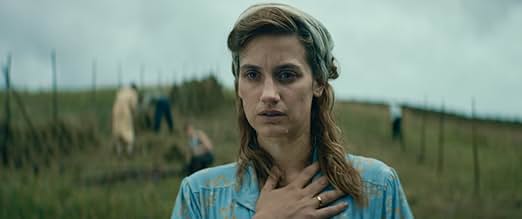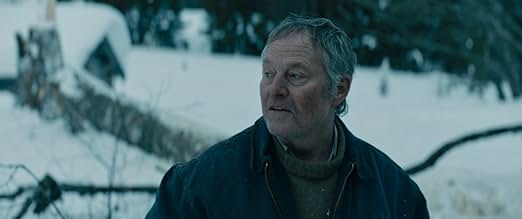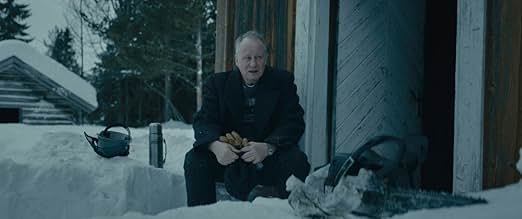VALUTAZIONE IMDb
6,5/10
3494
LA TUA VALUTAZIONE
Aggiungi una trama nella tua linguaA grieving widower moves to the country where a chance encounter rekindles memories from his past.A grieving widower moves to the country where a chance encounter rekindles memories from his past.A grieving widower moves to the country where a chance encounter rekindles memories from his past.
- Regia
- Sceneggiatura
- Star
- Premi
- 7 vittorie e 11 candidature totali
Tone Beate Mostraum
- Tronds mor
- (as Beate Mostraum)
Anders Baasmo
- Olav
- (as Anders Baasmo Christiansen)
Recensioni in evidenza
10lpuraite
My sincere Thanks for this magic and deep movie to the film director, the actors, all entire team and producing company.
I'm very grateful and happy that I got to see this movie live in the cinema in my own language. I am grateful to the film director and the all entire team.
I'm not sure if this movie is for everyone. Perhaps only a mature, artistic or life experienced person can sense and understand it. I was involved and lulled like listening to poem, orchestra or lullaby from the very first to the last second, the scene, the view, the sound .. I wanted it to last longer ... And the movie still leaves in me.. Left threads..
Each tiny sound, angle, moment, view, actors, acting.. resonated within me. It felt like Director is playing the strings in me, touches, hits each hidden moment, emotion, living in me. Amazing camera, sound and others job. Amazing actors, amazing acting, high level art . Each made me feel wanna cry from amazing "job" done.
And I didn't care actually about the story line too much this time. My opinion, it's not the point about this movie. I went out uplifted, deeply touched and the movie stayed within me... with me. Like a very very close and intimate friend.
Thank you from Lithuania.
Saw this at the Berlinale 2019, where it was part of the official Competition for the golden bear. While not winning the 1st Prize, the jury awarded a Silver Bear for Outstanding Artistic Contribution, for Rasmus Videbæk who was responsible for the cinematography. Be that as it may, however, the movie failed to interest me in the protagonists and their behavior. Shots of landscapes, rivers, nature and (of course, given the title) the horses were more interesting than what the actors said and did. So, it could have been a nice watch but that is never my prime reason to see a movie.
In particular, the frequent switching between 1999 and 1948 annoyed me several times. It broke the logic flow in the story line. Luckily, it was clear with every flash back/forward in which time frame we were, due to other actors playing the younger variants. For me it remained unclear from start to finish what it was that the protagonists did tick, and why they did what they did. I cannot imagine that the fatal Cain/Abel scene, where a young boy inadvertently shot his brother, can have such a long term bearing on everyone actions, but what do I know??
Maybe the underlying book is better in explaining the psychology driving these people's actions, but I missed it dearly here. It is even very well possible that the Cain/Abel scene was not so important after all, but that it was the woman he had eyes on but who was in fact courted by his father. I wonder, due to suggestions in that direction in the announcement on the Berlinale website, but I can recall only a single scene from memory to more or less confirm this plot element.
All in all, despite the visual elements to make it a nice watch, I failed to get interested in the story or the psychology of the protagonists. I see hints in various reviews that there is more substance than I could derive from it. Such things can happen during a festival where one sees three of four movies per day.
In particular, the frequent switching between 1999 and 1948 annoyed me several times. It broke the logic flow in the story line. Luckily, it was clear with every flash back/forward in which time frame we were, due to other actors playing the younger variants. For me it remained unclear from start to finish what it was that the protagonists did tick, and why they did what they did. I cannot imagine that the fatal Cain/Abel scene, where a young boy inadvertently shot his brother, can have such a long term bearing on everyone actions, but what do I know??
Maybe the underlying book is better in explaining the psychology driving these people's actions, but I missed it dearly here. It is even very well possible that the Cain/Abel scene was not so important after all, but that it was the woman he had eyes on but who was in fact courted by his father. I wonder, due to suggestions in that direction in the announcement on the Berlinale website, but I can recall only a single scene from memory to more or less confirm this plot element.
All in all, despite the visual elements to make it a nice watch, I failed to get interested in the story or the psychology of the protagonists. I see hints in various reviews that there is more substance than I could derive from it. Such things can happen during a festival where one sees three of four movies per day.
Full of fascinating...ographies and curious adolescent...chologies but as bland as wallpaper paste mixed with plain flour, only curiosity is why they've stolen your sleep sheep and replaced them with this - same effect - lights out!
There are no spoilers in this review.
This magnificent film is based on Per Petterson's novel 'Out Stealing Horses' (Ut Og Stjæle Hester). I discovered this film at the 2019 Scandinavian Film Festival in Australia. It is mesmerising, poetic, and the cinematography is truely breathtaking. The soundtrack is both haunting and unique. Each scene was an exercise in detail. Waterfalls, owls, rainstorms, wind, moss, rivers, trees, and horses in the Norwegian forest provided a rich tapestry of backdrops which were seamlessly integrated into the story.
The clever use of seasons made the story's timeline easy to follow. The major storyline took place in the summer of 1948, and the flashbacks (from the main character, Trond) were from the winter of 1999. There was also one short scene that took place during the German occupation of Norway, and another brief scene from around 1957.
This film is both visual and script driven. The acting from every character was flawless. It goes without saying that the performances from both Stellan Skarsgård (the 67 year old Trond) and Tobias Santelmann (Trond's father) were brilliant - as always from these two seasoned actors. The real stunner, however, was Jon Ranes playing the 15 year old Trond who did a lot of the heavy lifting for this film. He was amazing and really brought life to the character and the story. I think great things await Ranes as an actor going forward.
The movie is about a 67 year old Norwegian man (Trond) reflecting back on a summer he spent with his father when he was 15 years old. The movie navigates multiple issues. These include how traumatic events early in ones life can affect a person, coming of age, father/son relationships & rivalries, loss, overcoming life's obstacles, and abandonment were all explored. If you love beautiful and deeply meaningful movies - this one should not be missed. It is really something special.
This magnificent film is based on Per Petterson's novel 'Out Stealing Horses' (Ut Og Stjæle Hester). I discovered this film at the 2019 Scandinavian Film Festival in Australia. It is mesmerising, poetic, and the cinematography is truely breathtaking. The soundtrack is both haunting and unique. Each scene was an exercise in detail. Waterfalls, owls, rainstorms, wind, moss, rivers, trees, and horses in the Norwegian forest provided a rich tapestry of backdrops which were seamlessly integrated into the story.
The clever use of seasons made the story's timeline easy to follow. The major storyline took place in the summer of 1948, and the flashbacks (from the main character, Trond) were from the winter of 1999. There was also one short scene that took place during the German occupation of Norway, and another brief scene from around 1957.
This film is both visual and script driven. The acting from every character was flawless. It goes without saying that the performances from both Stellan Skarsgård (the 67 year old Trond) and Tobias Santelmann (Trond's father) were brilliant - as always from these two seasoned actors. The real stunner, however, was Jon Ranes playing the 15 year old Trond who did a lot of the heavy lifting for this film. He was amazing and really brought life to the character and the story. I think great things await Ranes as an actor going forward.
The movie is about a 67 year old Norwegian man (Trond) reflecting back on a summer he spent with his father when he was 15 years old. The movie navigates multiple issues. These include how traumatic events early in ones life can affect a person, coming of age, father/son relationships & rivalries, loss, overcoming life's obstacles, and abandonment were all explored. If you love beautiful and deeply meaningful movies - this one should not be missed. It is really something special.
Watching movies at a festival has disadvantages. The second movie (or the next ones!) seen on the same day may catch you as a more tired spectator, or under the impression of the previous movie, or confused by the alternation of styles and genres. This is, perhaps, what happened to me watching the Norwegian director Hans Petter Moland's film 'Ut og stjæle hester' (or 'Out Stealing Horses'), a psychological drama with references to the relatively recent history, interestingly constructed, and benefiting from the participation of an excellent team of actors. And yet, although I really liked one of Moland's previous films ('In Order of Disappearance'), I was a little stuck watching this movie. The fault may be mine, but not only mine.
The story takes place in 1999, on the threshold of the millennium, that period exactly 20 years ago, when the entire planet was preparing for parties and was obsessed with the millennium bug. The main hero (the excellent Stellan Skarsgård) seems to be trying to run away from the world after he his wife had died in a traffic accident, buying a house in a village far from the turmoil of the world. It is precisely here that the past reaches him through the accidental encounter of a forgotten friend from adolescence. The film reconstructs through interleaved flashbacks the decisive summer of his coming to age, in the years immediately following the war that had left traces in people's souls and in the relationships between them. We progress in the remembrance of the past together with the old man. But how much of memory can be trusted after a lifetime has passed? Was the reality then known, understood, and especially as does it matter today?
The questions are interesting, but one of the problems of the film is that the scriptwriter (also Moland adapting a novel) and the director try to give them a little too explicit answer, along the lines of Buddhist philosophy. Another problem is the lack of dynamism in the evolution of the characters. The film is beautifully filmed and played brilliantly (by Skarsgård, but also by the young actor who plays him as a teenager, and by the whole team), and yet 'Out Stealing Horses' failed to captivate me, introduce me to the story, involve me. The distance between me and Scandinavia, its history, its people and problems, has not been completely eliminated in this film.
The story takes place in 1999, on the threshold of the millennium, that period exactly 20 years ago, when the entire planet was preparing for parties and was obsessed with the millennium bug. The main hero (the excellent Stellan Skarsgård) seems to be trying to run away from the world after he his wife had died in a traffic accident, buying a house in a village far from the turmoil of the world. It is precisely here that the past reaches him through the accidental encounter of a forgotten friend from adolescence. The film reconstructs through interleaved flashbacks the decisive summer of his coming to age, in the years immediately following the war that had left traces in people's souls and in the relationships between them. We progress in the remembrance of the past together with the old man. But how much of memory can be trusted after a lifetime has passed? Was the reality then known, understood, and especially as does it matter today?
The questions are interesting, but one of the problems of the film is that the scriptwriter (also Moland adapting a novel) and the director try to give them a little too explicit answer, along the lines of Buddhist philosophy. Another problem is the lack of dynamism in the evolution of the characters. The film is beautifully filmed and played brilliantly (by Skarsgård, but also by the young actor who plays him as a teenager, and by the whole team), and yet 'Out Stealing Horses' failed to captivate me, introduce me to the story, involve me. The distance between me and Scandinavia, its history, its people and problems, has not been completely eliminated in this film.
Lo sapevi?
- QuizTobias Santelmann, Pål Sverre Hagen and Anders Baasmo previously worked together on Kon-Tiki (2012), as Knut Haugland, Thor Heyerdahl, and Herman Watzinger respectively.
- Colonne sonoreVindhester
Composed by Kåre Vestrheim
I più visti
Accedi per valutare e creare un elenco di titoli salvati per ottenere consigli personalizzati
- How long is Out Stealing Horses?Powered by Alexa
Dettagli
- Data di uscita
- Paesi di origine
- Sito ufficiale
- Lingue
- Celebre anche come
- Out Stealing Horses
- Luoghi delle riprese
- Aziende produttrici
- Vedi altri crediti dell’azienda su IMDbPro
Botteghino
- Budget
- 4.100.000 € (previsto)
- Lordo in tutto il mondo
- 1.480.790 USD
- Tempo di esecuzione
- 2h 3min(123 min)
- Colore
- Proporzioni
- 2.35 : 1
Contribuisci a questa pagina
Suggerisci una modifica o aggiungi i contenuti mancanti



